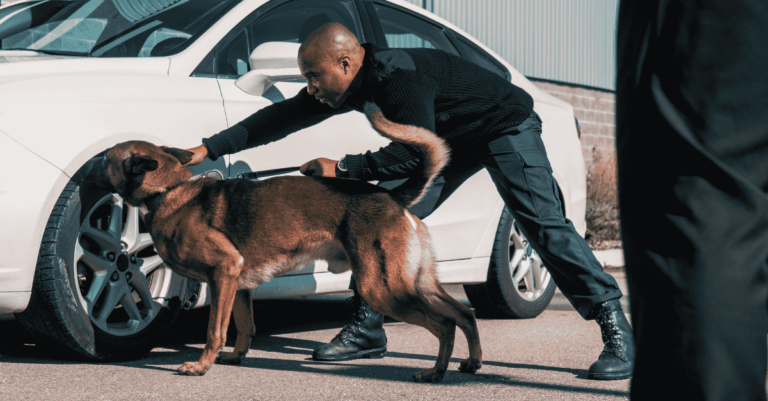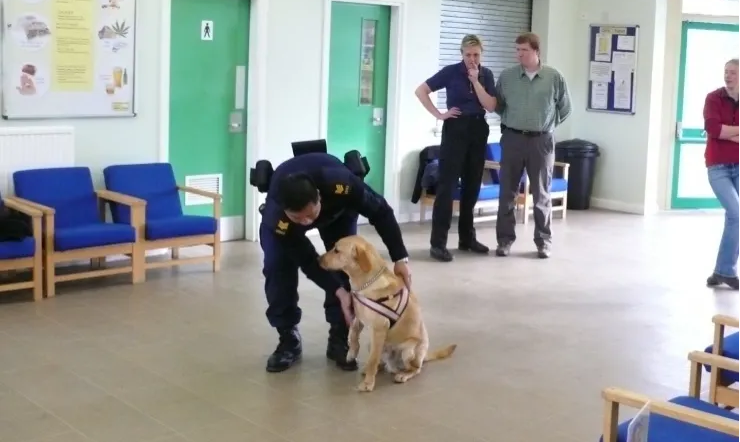Dog handlers serve as the cornerstone of specialist operations across law enforcement, military forces, search and rescue teams worldwide. The demanding nature of these roles requires individuals who possess not only technical expertise but also the personal attributes necessary to form effective partnerships with highly trained canines.
The profession presents both significant challenges and extraordinary rewards. Handlers must demonstrate exceptional skill under pressure whilst maintaining the welfare and operational capability of their canine partners. Success in this field demands a unique combination of physical capability, mental acuity, and emotional intelligence.
Since 1953, Karenswood (International) Ltd has established itself as the definitive authority in dog handler training, having developed the techniques and standards that form the foundation of modern canine operations. Our extensive experience across 82 countries and collaboration with 27 governments provides unparalleled insight into the qualities that distinguish exceptional dog handlers from the merely competent.
What Does a Professional Dog Handler Do?
Professional dog handlers play a vital role in training, managing and deploying specialist working dogs across a variety of operational scenarios. Their responsibilities extend far beyond supervising the dogs, handlers are deeply involved in daily care routines, including feeding, grooming and monitoring the health and well-being of their canine partners. They also oversee ongoing training to refine and maintain the dogs’ skills, ensuring they are mission-ready for high stakes operations that demand precision and reliability.
The scope of operational roles for these teams is diverse, ranging from detecting explosives and narcotics to conducting search and rescue missions or performing security patrols. This requires handlers to be both versatile and adaptable. Attention to detail is paramount, as they are responsible for meticulously documenting everything from training progress and health records to mission outcomes, ensuring accountability and operational preparedness.
Handlers serve as the crucial bridge between the exceptional capabilities of their highly trained dogs and the objectives of each mission. They interpret mission requirements and translate them into actionable strategies, such as search patterns, detection protocols, or patrol assignments, all tailored to the specific environment or threat. Success in these roles demands peak physical and mental performance, not just from the dogs but from the handlers as well, especially when operating in challenging or unpredictable conditions.
At Karenswood, we offer a comprehensive Dog Handler & Instructor Training programme that is meticulously designed to prepare individuals for the demanding requirements of professional dog handling. This training focuses on developing both the technical and practical skills needed to excel in complex environments, ensuring that handlers can confidently adapt to a wide range of scenarios. We cover advanced training techniques, canine behaviour analysis and effective communication strategies, enabling participants to build strong working relationships with their dogs.

What Is the Difference Between a Dog Handler and a Dog Trainer?
Dog handlers and dog trainers play distinct yet complementary roles in working with canines. Handlers are primarily responsible for the operational use and ongoing upkeep of a dog’s trained skills. They work with dogs that have already undergone training, refining and maintaining these abilities through consistent practice and real world application.
In contrast, dog trainers focus on developing new skills and behaviors in canines. Their expertise lies in behavior modification, learning theory and structured methodologies for skill development. Trainers design comprehensive training programs, establishing the foundational abilities that handlers later sustain and apply in the field.
The role of an instructor bridges the gap between these two disciplines. Instructors must combine extensive handling experience with the ability to effectively teach others. They deliver both theoretical knowledge and practical demonstrations to equip students with the skills needed to succeed in their respective roles.
What Qualities Do You Need to Be a Dog Handler?
The selection and development of professional dog handlers requires careful consideration of specific attributes that directly impact operational effectiveness. These qualities cannot be developed through training alone, they must be inherent characteristics that can be refined and enhanced through professional instruction.
Patience and Empathy
The foundation of effective dog handling lies in understanding canine psychology and behaviour. Successful handlers demonstrate exceptional patience when working with dogs, recognising that each animal possesses unique temperament characteristics and learning capabilities. This patience extends beyond initial training phases into operational deployment, where handlers must maintain composure during challenging situations.
Empathy enables handlers to interpret canine communication signals accurately, distinguishing between normal behaviour patterns and indicators of stress, fatigue or detection alerts. For instance, a narcotics detection dog may exhibit subtle behavioural changes when approaching target substances that only an empathetic handler would recognise and respond to appropriately.
The ability to understand and respond to canine emotional states proves crucial during high-stress operations. For example, a handler working with a gas leak detection dog must recognise when their partner requires encouragement versus when firmness is necessary to maintain focus and discipline.
Effective Communication
Professional dog handlers must master both verbal and non-verbal communication techniques. Clear, consistent command delivery ensures reliable responses from canine partners, particularly in environments where ambient noise or distractions may interfere with standard communication methods.
Non-verbal communication often proves more significant than verbal commands. Dogs respond instinctively to body language, posture and handler confidence levels. A handler’s physical stance can convey authority, reassurance or urgency to their canine partner without disrupting operational silence requirements.
Consider an operation where verbal commands might compromise the safety of trapped individuals. Experienced handlers rely on subtle hand signals and body positioning to direct their dogs through complex search patterns whilst maintaining operational discretion.
Adaptability Under Pressure
Operational environments present constantly changing variables that require immediate assessment and response. Successful dog handlers demonstrate exceptional adaptability, modifying their approach based on environmental conditions, operational requirements and canine partner responses.
High pressure situations test both handler composure and decision making capabilities. An explosives detection team responding to a potential threat must adapt their search methodology based on environmental factors whilst maintaining systematic thoroughness and safety protocols.
Weather conditions, terrain variations and operational tempo changes require handlers to adjust their techniques without compromising effectiveness. A mine detection dog team operating in extreme temperatures must modify their operational rhythm to maintain both human and canine performance levels.
Comprehensive Knowledge and Expertise
Professional dog handlers must possess a thorough understanding of canine biology, psychology and training methodologies. This knowledge extends beyond basic handling techniques to include recognition of health indicators, stress signals and performance optimisation factors.
Understanding scent theory proves crucial for detection work, as handlers must comprehend how environmental factors affect odour dispersal and canine detection capabilities. Knowledge of wind patterns, temperature variations and humidity levels directly impacts operational planning and execution.
Handlers must also maintain current understanding of relevant legislation, operational procedures and safety protocols. A police dog handler must understand legal requirements for evidence collection, proper documentation procedures and court testimony standards.

The Critical Role of Professional Training
The inherent qualities discussed above provide the foundation for effective dog handling, but professional training transforms these attributes into operational capabilities. Structured dog handler training programmes develop both technical skills and tactical knowledge necessary for specialist operations.
Karenswood’s training methodology emphasises practical application alongside theoretical understanding. Our courses integrate research-driven techniques developed through decades of operational experience, ensuring handlers receive instruction based on proven methodologies rather than theoretical concepts alone.
Professional training builds handler confidence through systematic skill development and progressive challenge introduction. Handlers learn to trust their abilities and their canine partners through carefully structured courses and exercises that simulate operational conditions.
Karenswood’s Training Excellence
Since its establishment in 1953, Karenswood (International) Ltd has pioneered training techniques that have become standard practice across global law enforcement, military and security organisations. Our original research into scent discrimination, explosive detection, and narcotics identification has formed the foundation for modern canine operations.
Our training programmes address every aspect of professional dog handling, from initial selection criteria through advanced operational deployment. Students receive instruction in internationally recognised standards that prepare them for specialist roles across police, customs, search and rescue and military applications.
The Karenswood approach emphasises understanding over memorisation, ensuring handlers develop the analytical capabilities necessary to adapt their techniques to varied operational requirements. This philosophical approach has enabled our graduates to excel in diverse environments across all continents.
